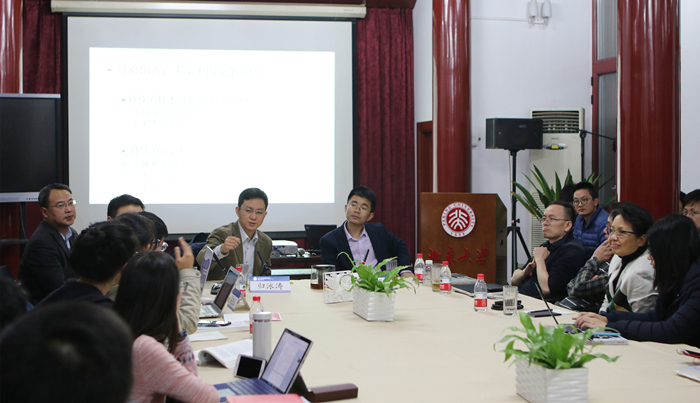
On the evening of November 26th, 2018, the Institute of International and Strategic Studies (IISS), Peking University (PKU) held the 26th seminar of "North Pavilion Seminar" series. Li Wei, Professor of the School of International Studies and Research Fellow of the National Academy of Development and Strategy, Renmin University of China, gave a seminar entitled "From 'Economic Decoupling' to 'Social Disembedding': China-U.S. Trade War and Its Tragic Consequences". The seminar was hosted by Gui Yongtao, Assistant President of the IISS and Vice President of the School of International Studies (SIS), PKU.
Prof. Li Wei introduced the China-U.S. trade war and China-U.S. relations from three aspects, i.e. the historical changes in China-U.S. strategic relations, the end and consequences of the U.S.'s economic engagement policy, and China's difficulties in rise and their countermeasures. Prof. Li pointed out that the strategic relations between China and the U.S. has gone through four stages of hostility, cooperation, ambiguity, and competition. The year 2018 is the critical point of a new qualitative change. The U.S. announced the end of the economic engagement policy, strengthened security precautions, and made stronger value criticism of China. Meanwhile, China has undergone major changes itself and entered a new era, and has proposed more Chinese programs and Chinese routes on the international stage.
Prof. Li opined that the "competition strategy" is a key word in the U.S. policy toward China, and the priority of the strategy is the economic relationship between China and the U.S. There are three dimensions in the China-U.S. trade war, which are tariff war, investment war, and technology war. The conflict in the financial sector is a bomb that has not yet exploded but may be more dangerous. As both China and the U.S. are facing difficulties in economic security, economic demand and open cooperation become very fragile in the face of political ideology and security difficulties, and both countries have placed economic security in an increasingly important position. The four pillars of the U.S. security, which are military, finance, technology, and value, are all facing difficulties. Trump and his team's series of actions are actually addressing these problems seriously.
Prof. Li emphasized that the essence of the economic decoupling between China and the U.S. is that both countries have taken the other side as an imaginary enemy and the most important opponent strategically. In addition to reduction in economic efficiency in both countries, the economic decoupling will also create an impact on the societies. Finally, in the era of strategic competition, China's strategy is to stick to opening-up, consolidate the domestic foundation, and maintain political stability.
In the comment and question-and-answer session, Prof. Li had in-depth exchanges and discussions with the teachers and students present at the seminar on issues such as the strategic mistakes of the Trump administration, the domestic politics of the U.S., and the winners and losers in the China-U.S. trade war. (Contributed by Huang Xiaoting)
Editor: Li Fangqi, photography: Zheng Peijie

